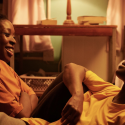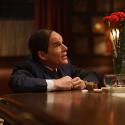Few heroes of cult genre television ever manage the transition into mainstream financial success – although JJ Abrams hasn't been doing too badly for himself – and for many years Joss Whedon's deified status among fans of his various lovingly crafted, emotionally rich series was not reflected by broader recognition.
Buffy the Vampire Slayer, its spin-off series Angel, and space-western Firefly have all maintained a passionately devoted core of fans, despite all having been off the air for almost a decade, and it was largely thanks to fan campaigning that Whedon made his feature directing debut on 2006 sci-fi Serenity. And yet he was still only a household name in a very specific subset of households, and his long-gestating Wonder Woman film project stalled soon after Serenity's debut.
It now looks as though his big-screen curse has been well and truly broken
Then came last year's The Avengers, Whedon's smart and impassioned take on a Marvel ensemble piece that should by rights have been a mess, but which instead opened to universally warm reviews and became the third highest-grossing film of all time.
It says a lot about Whedon that what he chose to do with his fortnight of downtime in between production and post-production on The Avengers was make a micro-budget adaptation of a Shakespearean comedy. It also says a lot that the comedy he chose was Much Ado About Nothing, which contains what may be Shakespeare's most overtly feminist speech.
Whedon created Buffy the Vampire Slayer as a response to the horror trope of the helpless, doomed blonde girl in a dark alley, giving that girl back her power. And while Buffy's seven-year television run came about because the original feature film was taken out of Whedon's hands, it now looks as though his big-screen curse has been well and truly broken, with Much Ado enjoying an unexpectedly strong box office opening in the US this weekend. It stars Whedon regulars Amy Acker (pictured below) and Alexis Denisof as Beatrice and Benedick.
When theartsdesk meets Whedon in London, he's at the tail end of a lengthy day of press and has spent several hours locked, vampiric, in a room without windows. But his enthusiasm for the project, his affection for the characters and his intricate knowledge of the text are untempered.

EMMA DIBDIN: You’ve described Much Ado as the most accessible of Shakespeare’s comedies. What was it about the text that jumped out at you as appealing to a contemporary audience?
JOSS WHEDON: It has the least fantasy of all of the comedies, it has no verse at all, and it is structurally the grandpappy of all romantic comedies. I think even people who never watch Shakespeare, with Beatrice and Benedick they can just fall in, and go "Oh my God, they’re hilarious" and "Oh, she’s… making a feminist credo here, that’s kind of unexpected!" So that was what started me on it, and then I really delved into the text with the idea of, "Well, what if I am going to film this?"
And it was at that point I realised that the whole play is fascinating – it’s not just a two-man show, and then waiting through the wedding scene until the two come back again. It’s all in service of a very textured and weird and cynical and sort of romantic view of love, and our rituals of love, and that to me made it worth doing. I wanted to do it because of Amy and Alexis, but I decided to do it because I thought "Okay, he's got something to say here", and it's all of a piece.
Also, the fact that it all takes place in one setting gave it a visual coherence that, with the incredibly limited amount of time I had, was sort of essential. Leonato’s estate is such an important part of what it is, and knowing exactly how I felt about that space, and how I wanted to film it, made it the perfect thing.
You went straight from principal photography on The Avengers into shooting Much Ado. How much did your approach shift between those two projects?
With Much Ado, I was really in service of the script and the acting, in a way that didn't allow me to get very tricky. And that isn't to say that I didn't have a visual idea of what I wanted, but what I mostly wanted was to get through about eight pages a day, and to capture some of the energy of the live performance. So we never split a scene into two days, for example. Just facilitating that energy alone dictated a lot of choices.
Then, of course, I had one advantage that I never had on The Avengers, which was that I got to spend a lot of time on the set, prepping! So I was really able to use the space in exactly the way that I wanted to. On Avengers, you know, the paint was drying when we got onto the set, or there would be a location that we’d get too late. Whereas here I was able to, and needed to, have a really strong sense of where things would happen, and how the space would be used.
 You’re largely faithful to the text, but you add some key moments to expand on relationships, including a flashback to Beatrice and Benedick’s past. What was the thought process behind those additions? (Acker and Denisof pictured)
You’re largely faithful to the text, but you add some key moments to expand on relationships, including a flashback to Beatrice and Benedick’s past. What was the thought process behind those additions? (Acker and Denisof pictured)
We decided to open with an earlier time, with Beatrice and Benedick having a one-night stand that we later flash back to, because I wasn't born yesterday - sex sex sex sex sex sex! Yes. But no, Amy and Alexis and I discussed it a lot. Some people interpret the text that way, the "I know you of old" line. But it’s sort of six of one, it doesn’t really affect the main body of the thing. We all just liked that texture, for the way they behave towards each other. We felt it gave their banter an intimacy, and a painful quality that you might not have otherwise.
How about the decision to have Hero watching Claudio grieve over her?
That was a really important addition. A lot of this for me was about finding the strength in Hero; she doesn't talk a great deal, and I think she often gets shunted aside as a completely passive character. But she is the only character who never believes something that is not true. Even though she doesn't fully understand what's happening, I don't think of her as this passive person, and I chose Jillian because she has a quality that I also see in Amy, of being really majestic and put together, in charge of herself. The grieving scene, her watching him grieve, and seeing "oh, he really means it", for me that was empowering, but also necessary.
Because it's always a buy, when Hero and Claudio get together at the end, and I thought the step that will take this to where I can accept it is the idea that she sees him at the tomb, and knows, even though we took out his big speech about it, that he is genuinely upset. He's not as upset as he could have been, because Fran was like "Okay! Are we going again, because I can really bring it this time!" I was like "What part of magic hour do you not understand? Magic hour is 10 minutes long! We got that shot, we're moving on!" But besides the fact that it's probably the most beautiful shot in the movie, I love the fact that she's there, and I love the fact that Beatrice is with her.
Overleaf: "I'm so lazy. There's nothing better than rolling out of bed and going 'Action!'"
 You added scenes, but not dialogue, and made the usual kind of cuts filmmakers have to with Shakespeare. Was there anything else you would have liked to add, in retrospect?
You added scenes, but not dialogue, and made the usual kind of cuts filmmakers have to with Shakespeare. Was there anything else you would have liked to add, in retrospect?
Yeah, we did not change a word, except for a few that we had to. We changed a couple of pronouns, because I put some girls in there, and I combined and dropped a couple of characters. Because you do have to make a film, after all. And I changed something that was offensive, but I still left something else that was offensive in, because Fran and I were so excited about the Ethiope line.
I feel like I might have wanted to do that even more, for example so that it really lands that Margaret is clearly in love with Borachio, who's clearly in love with Hero, and he's sort of using her, and she sort of knows it, and that’s her sad story. What if I'd just been able to spend a little time creating new scenes? Because I didn't think of Hero being in the grieving scene as creating a new scene, it was just giving a little extra texture.
What challenges were posed by the decision to film in your own home?
 The challenges were occasionally, you know, the kids would have to sleep with us because we were filming in their room! But the challenges were far outweighed by the advantages. There was this amazing energy running through the house – the house has an amazing energy anyway, it's part of why I wanted to film there – but it just sort of blew up during the shoot. And I'm so lazy. There's nothing better than rolling out of bed and going "Action!"
The challenges were occasionally, you know, the kids would have to sleep with us because we were filming in their room! But the challenges were far outweighed by the advantages. There was this amazing energy running through the house – the house has an amazing energy anyway, it's part of why I wanted to film there – but it just sort of blew up during the shoot. And I'm so lazy. There's nothing better than rolling out of bed and going "Action!"
Soliloquies are always a challenge on film, and here you get around that by combining them with physical business, like Benedick jogging. How much of that was blocked out in advance, and how much happened on the day?
Very little happened on the day, just because we had to be very prepared and everything had been blocked out so specifically. The DP, Jay Hunter, spent a day at the house just watching the sun, so that we could figure out our schedule based on "Where is the light?"
Alexis and I both thought it felt natural for him to be jogging up and down stairs, so Jay, who also shot the film, had to run up and down stairs behind him, and in front of him backwards. I don't know if he thought that one through, just because it was very difficult to frame. It's always about trying to find something naturalistic and something that adds to the scene, so they're not just standing there. You know, what do these characters do? And if he's complaining about how he's all lovelorn, it makes sense – rather than just sort of wandering through the trees, picking at leaves – that he would say, "I'm a man of action, I'm going to go exercise."
And then we got to the "Beatrice, I thank you for your pains" scene, and what Alexis did in that scene actually was developed on the day. I was like "You've gone bonkers!" And I really thought, "Is this too far?" And it's most people's favourite thing in the movie, I think. I laugh every time I see it. So yeah, he took that ball and ran with it.
 Is this more or less intimidating to present to an audience than something like The Avengers, which has more financial pressure behind it but also feels like less of a personal project?
Is this more or less intimidating to present to an audience than something like The Avengers, which has more financial pressure behind it but also feels like less of a personal project?
This is more scary. Not because it was more personal - the personal I don't mind, but because Shakespeare is not as worried about the audience. I mean, he is constantly worried about the audience, obviously, he's playing to the crowd and was very successful at it in his lifetime. But there is a long period, in what is supposed to be a comedy, where people are just sort of... talking, just hanging out. And then there's long stretches of very intense drama, and for me, I'm always begging for the audience's affection and attention, the moment the cameras are rolling.
So to just let it go, and say, "Here we go, kitchen scene, with the messenger" – this is not the three witches, this is not a "Bang!" start, but this is the text and we're gonna let people come and let them warm up to it. It terrifies me! But it's how it has to be done, and so that's what frightens me. Shakespeare's so incredibly bipolar, and I respect that, and I relate to it, but it's hard for me to know how an audience is reacting unless they're laughing or crying.
Did you feel the weight of previous adaptations, either of Much Ado or other Shakespearean texts?
 You know, I've never done a stage production, and so with adapting something, there's always this terror that you're going to just ape what you've seen, or run so hard from it that you make something counter-intuitive. And of course, I had the Branagh to deal with, because I'd seen that a few times. All right, more than a few… I knew what I wanted to accomplish was different enough that I wasn't really worried about it. I think we approached it as "this is our production", which fed into the decision to give Beatrice and Benedick this past fling. We’re not closing the door on the text, we’re not saying, "No, it’s this." It’s just another production, and that gives us the freedom to experiment a little bit and open it up without, hopefully, subverting what was there.
You know, I've never done a stage production, and so with adapting something, there's always this terror that you're going to just ape what you've seen, or run so hard from it that you make something counter-intuitive. And of course, I had the Branagh to deal with, because I'd seen that a few times. All right, more than a few… I knew what I wanted to accomplish was different enough that I wasn't really worried about it. I think we approached it as "this is our production", which fed into the decision to give Beatrice and Benedick this past fling. We’re not closing the door on the text, we’re not saying, "No, it’s this." It’s just another production, and that gives us the freedom to experiment a little bit and open it up without, hopefully, subverting what was there.
Shakespeare can be daunting even for experienced directors – do you have any advice for a young director or filmmaker approaching it for the first time?
I'd say first of all, stop worrying. He's dead, he doesn't know! You have to find out what it means to you. And if someone is actually young, and setting out to film Shakespeare, odds are that it means something to them, odds are the hard work's already been done. Then it's just a question of making the decision of how to visually complement that, what is your visual template that makes this not a stage reading? Make those decisions, and then get out of the way. Because I think you see a lot of productions that try to outsmart Shakespeare, and it's just like…no, no, he’s still the smartest guy in the room. As long as you're committing to an understanding of what is being said, and it's being conveyed emotionally and visually, then just let him do the work.
- Much Ado About Nothing is released on Friday 14 June














Add comment